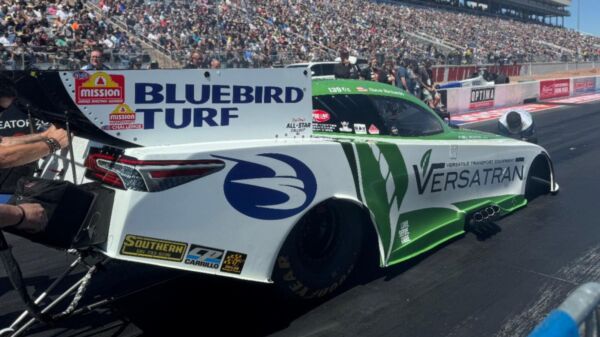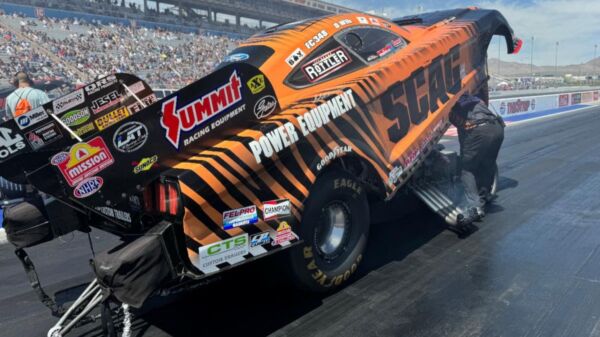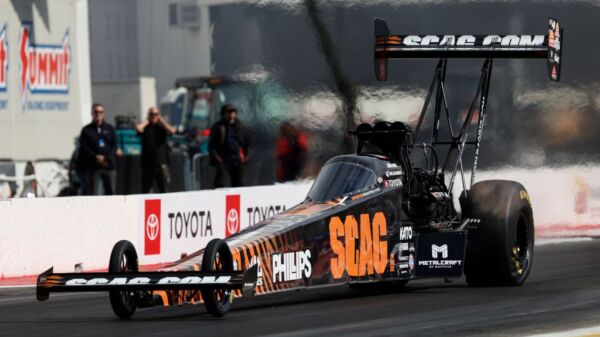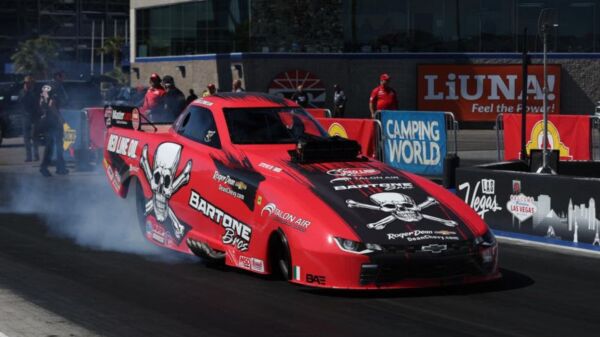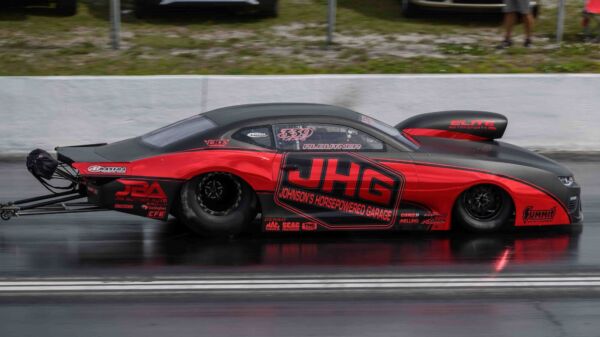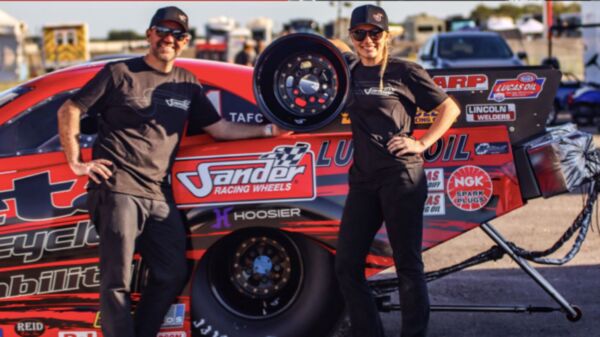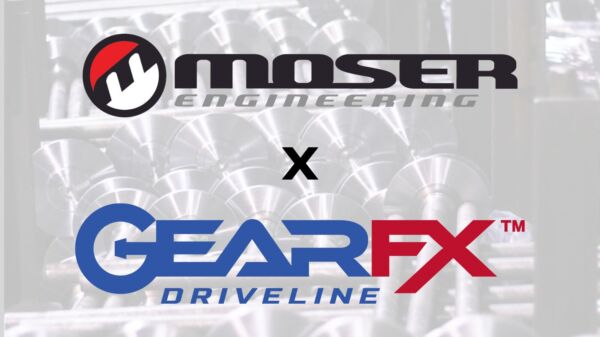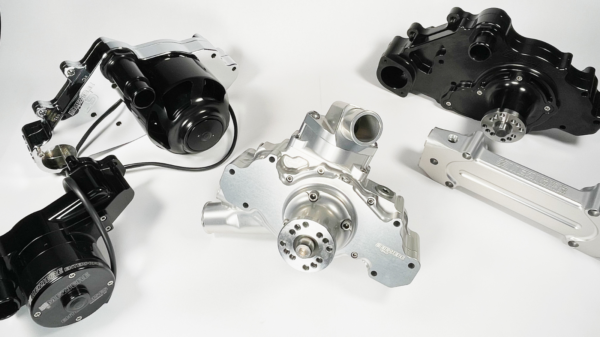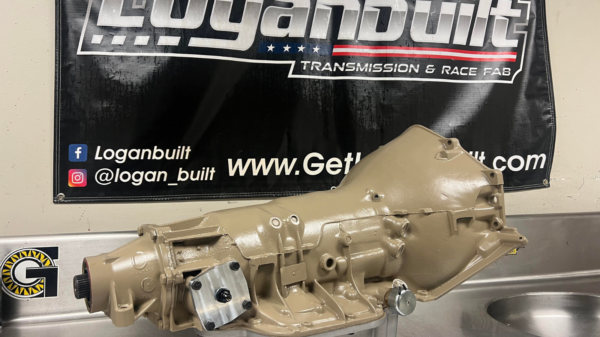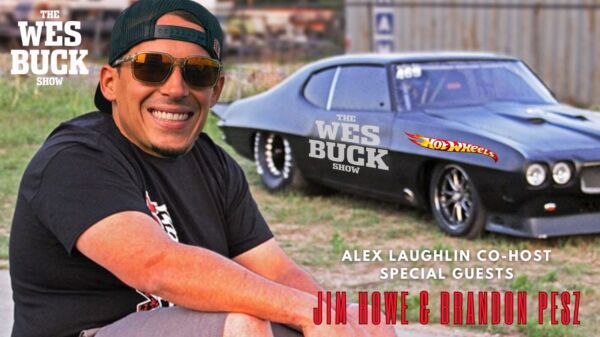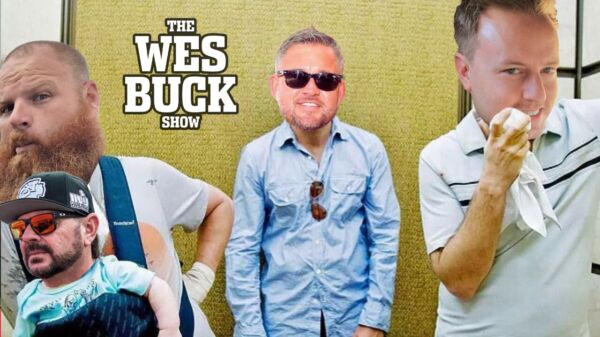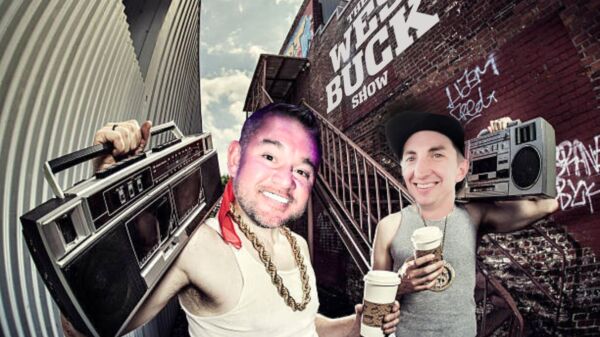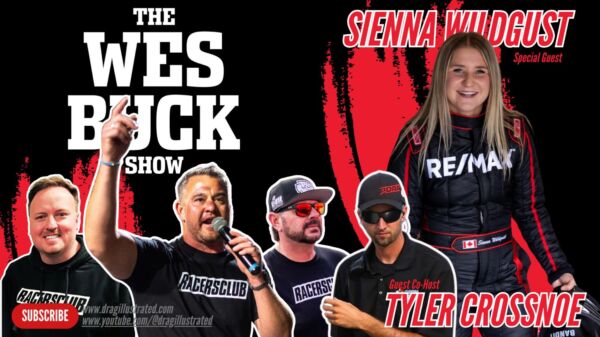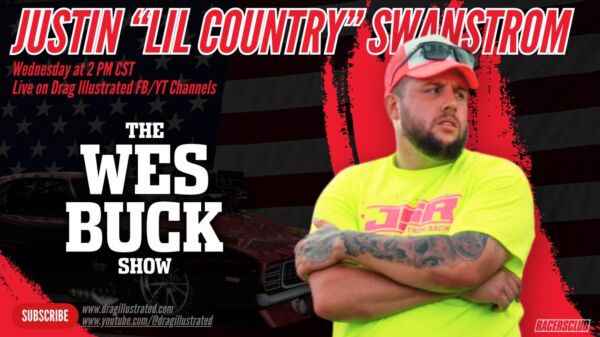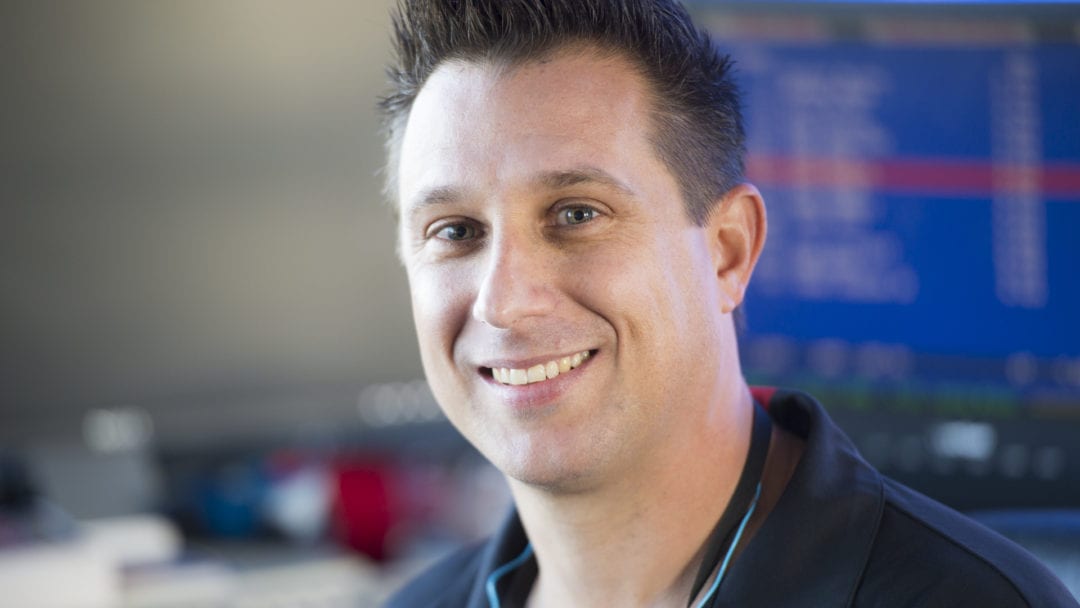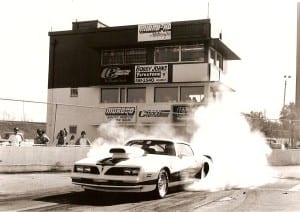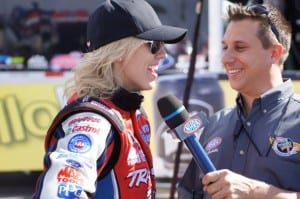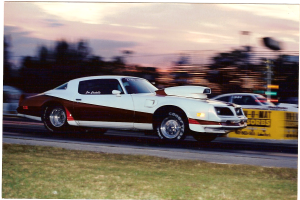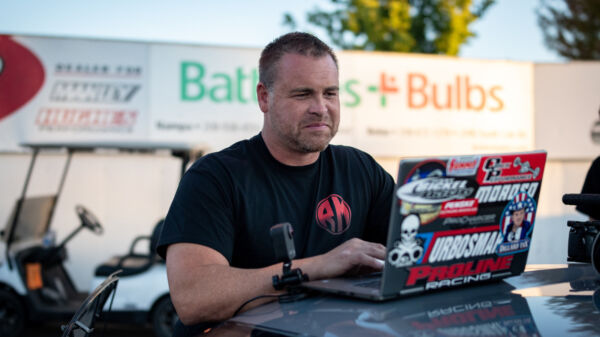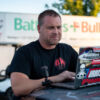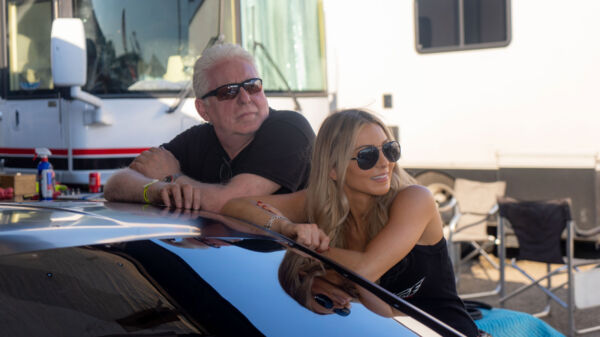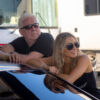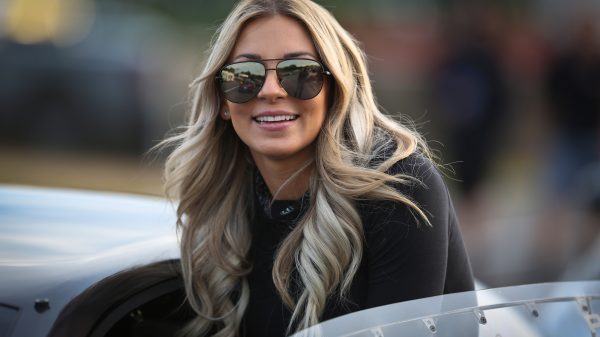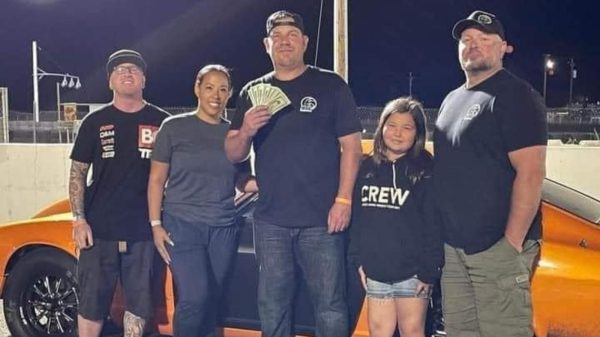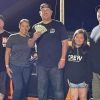In one way or another, you’ve probably heard Joe Castello’s voice before. Maybe it came over the PA system at the last NHRA national event you attended, or you heard it in the background as you watched the livestream of pre-season testing at Palm Beach International Raceway. Or maybe you’re one of thousands of race fans who tune in weekly to Castello’s WFO Radio shows, an online radio program dedicated to motorsports. Shows cover NASCAR and IndyCar, but the most popular show is the NHRA Nitro edition on Tuesday nights, when NHRA announcer Alan Reinhart and drivers, crew chiefs and team owners break down or preview the latest or upcoming national event.
A south Florida native, Castello’s first experience at the dragstrip was as a toddler with his parents. His passion for drag racing grew as he got older and he began announcing at his local Miami-Hollywood Speedway, where he also won a track championship as a driver. A career in radio soon followed, first at various SoFlo terrestrial radio stations and later at XM Satellite Radio. Realizing the Internet was the way of the future, Castello created WFO Radio in 2009 to continue his popular motorsports programming for the masses. He built a reputation with the fans, drivers and PR reps, as fans were given a new medium to connect with their favorite drivers and the teams given the added opportunity for exposure. Castello returned to his announcing roots in 2013 when NHRA launched a team of announcers to replace the legendary Bob Frey, who retired at the end of 2012. Since then, ‘WFO Joe’ has announced from the tower, reported from the starting line and top end, all while continuing to host WFO Radio. We spoke with Castello to discuss his career, but also to collect tips on how drivers can improve their interviews and media relationships.
DI: Who are some of your favorite people to interview?
JC: There’s a lot of people that I love interviewing on a regular basis. Right off the top of my head, Tony Schumacher always gives me something great. I’m always listening for the 20-30 second, awesome sound bite that makes the drag racer unique. Tony Schumacher will say whatever is on his mind. He will go against his competition. He will put himself in a position of having to put up or shut up. He’s a great interview. Antron Brown, John Force…all great interviews as you can imagine. Jason Line – you get him on the line talking long-form and he says a lot of great stuff that you just can’t get out of someone in a 40-second winner interview at the top end.
DI: Is there someone who you’ve always wanted to interview but haven’t yet had the chance?
JC: Absolutely. Connie Kalitta. I view myself as not only doing the show as an entertainment show that hopefully we’re building this online listener community, but also we’re documenting drag racing history for inevitably as long as the electric power is on. When we do an interview with ‘Big Daddy’ Don Garlits or Shirley Muldowney or John or Courtney Force, we’re capturing that moment in time, that interview, that race, what they thought, how they felt, what they sounded like. It’s important. As long as we keep the power on and we keep the audio files active people will be able to go back and use this as a resource at some point. I don’t know when or who or why, but if you want to know what Tony Schumacher thought after winning the 2009 championship immediately, what his emotions were, what he felt like, you can do that thanks to WFO Radio and our archive.
We have interviewed the Snake, the Mongoose, Garlits, Don Schumacher, Muldowney, and not Connie Kalitta. He’s the one guy we have not interviewed yet on the show. As these guys are passing away – Gordie Bonin passed away not long ago – I think, ‘my gosh, that’s it. I can’t get him. It’s over.’ And it’s troubling. You want to get together with these guys and ask them some questions and hear their voice before time runs out, whenever that will be. To this day, at this point, Connie Kalitta is the guy I’ve yet to interview.
DI: What has been your favorite part of traveling the tour these last few years as an announcer?
JC: First of all, it has been a great experience. Seeing the circus come and go, roll into town, set up and become a part of the community for a few days then move on has been really interesting and eye-opening to me. How it all works, what it takes, the people behind the scenes that I have gotten to know a little bit. Learning who they are and what they do.
All of a sudden you’re put in this pressure-packed situation of being challenged. You think you know the sport and you think you know how to learn something and then all of a sudden you’re really tested. Okay, now get to know 400 different people and their name and their face and bring it up immediately and have a question ready. It’s been a real test of my ability. It’s not easy and I’ve loved the challenge of it.
Being able to see some of these great performances and drivers up close, I’ve yet to become desensitized to the sport. Nitro cars and Pro Stock cars, I find myself looking at them and thinking they’re just amazing and why aren’t more people interested like I am? As everyone says to these questions, getting to know the people and what they’re doing and what they’re all about has probably been the best part.
DI: Can you compare your positions, whether it’s interviewing a driver from your studio or the top end, or announcing from the tower?
JC: The online show, which is available by free mobile application, iTunes and anything with Internet access, is designed to be a conversation, to go places, to maybe be funny. It’s designed to go places where we can’t go at the track because the racer has his game face on and he’s gotta go. That’s what the radio show is for. We catch them when their game face is off, when they have 20 to 30 minutes to talk in detail. At the track, it’s much quicker. You have them for two or three minutes, maybe. There’s cars, they’re going to start. You have to be much more quick and precise with your questioning. You’re going to get maybe one or two questions and you can’t work into a subject. You just hit it. They’re two totally different disciplines of interviewing. The conversational, long-form Barbara Walters-style interview versus the quick sideline interview. They’re totally different and you have to be able to navigate back and forth between them.
DI: What can racers like the Sportsman and Pro Mod guys, who don’t have the PR departments, do to help announcers and the media know a little more about them?
JC: Assume that people don’t know and that they need to be educated, simple as that. If you want the announcers to know something about you, make sure you tell them. If it’s just a typed-up piece of paper with a new sponsor, give me the information. Hand it to someone. ‘Look, this is something. You don’t necessarily need to read it but it will be in the brain.’ It will be absorbed if you give it to me. If you don’t, there’s a really good chance I won’t know about it. Some might say, ‘It’s your job to know.’ Yeah, it’s my job to know everything, but some of that everything is not going to make it. You can help by, if it’s important to you, taking a few minutes to make sure it is known.
Alan Reinhart has been a great mentor, not just to me but to all of the announcers. It’s amazing how much Alan Reinhart cares about the sportsman racers and how he is always coaching and educating the fellow announcers on how to service the sportsman racers and help them get the most out of their moments and all of that. There’s a lot of effort that he puts into going to the pits and going to people and having conversations, but that all takes time. You get in a golf cart and go down there, you find someone and talk to them and by the time you’re done talking it’s time to get back to the tower. That’s one person to learn about. If the racers took a little more initiative to make sure the people whose responsibility is to know stuff knew stuff, they would get a lot more out of it.
Here’s an example: At your local track, have you gone to the announcer and introduced yourself and said, ‘Hi, I’m so and so and here’s my car, just so you know. I want to know you and you to know me as best as we can. Have a good day.’ A connection as simple as that. Everybody is busy. Racers are racers and they’re trying to find horsepower and trying to make their program better and they’re a business owner and they’re definitely swamped by life, but the 10 minutes that it takes to make that personal connection, it will pay off somewhere some way in the long run.
DI: Are there any tips you can give to drivers to better their interview skills?
JC: I love being able to answer this. Everyone knows the difference between entertaining and boring. Entertaining is up-tempo, engaging and surprising. Boring is list of sponsors. We all know it. You can watch other people. Think of who the successful people are and how they do their interviews. It spells itself out right there. I like when racers engage, when they give me something that I wasn’t expecting, when they ask a question back. I love watching on television when a driver breaks the fourth wall, so to speak, and they look directly into the camera and talk to the audience. The same is true for my radio audience. I love when the racer understands that the microphone or the camera is just a vessel to get to this much larger group of interested people. If they know that, it’s going to be interesting.
The racer who feels like, ‘oh man, they want to ask me something that I don’t know what it is and I don’t know what to say’, they’re going to fail. What’s interesting? Well, you went fast. What was it like? How cool was it? Was it hard? ‘Man, things were shaking and there was fire and I didn’t know what I was going to do. I made the move, I pulled the ‘chutes and here I am.’ – exciting interview. ‘Well, you know, we worked hard and the guys are trying real hard and our sponsors are here’ – boring. It’s as simple as that. Tell the truth. If you’re angry, tell us! Why are you angry? Use judgment. You’ve gotta be quick. You’re a drag racer, your brain works faster than most people’s. You’re out there testing how fast your brain can work on a regular basis. You can figure out the right way to communicate without doing damage. I think that every racer needs to think about that. If they put a little pre-thought into it they’ll be successful, just like in everything else they’ve done; in business, in racing. These are all successful people. They can do it.
WFO Radio NHRA Nitro airs Tuesday nights at 7 PM EST on www.wforadio.com. Archived shows and interviews are also available.
GOOD READS
- Motorcyclist Online questions why the motorcycle community doesn’t embrace two-wheeled drag racing like they do with sports like supercross or road racing. They’re preaching to the choir here, but they bring up some interesting stats.
- Autoweek writer Steven Cole Smith had the chance to serve as a guest starter at the NHRA Toyota Nationals in Las Vegas last fall. He shares his experience in this recent article.
- Competition Plus is reporting that reigning NHRA Pro Stock world champion Erica Enders-Stevens does not have the funding to run the full tour this year. She missed a few races last year but still came out on top. Do you think the Elite Motorsports team will be able to do the same this year?
GOOD VIEWS
- ‘WFO Joe’ dug up this old bracket racing clip from 1992 when he was racing with his father at what is now Palm Beach International Raceway.
- WFO Radio has been known for interviewing the right people at the right time. In this clip, Joe and Alan speak with NHRA Top Fuel driver Antron Brown right after he won the 2011 U.S. Nationals.
- Danny Rowe Racing and Agave Underground Tequila show viewers what it takes to swap motors between qualifying sessions at an NHRA Pro Mod race last year.
This story was originally published on February 13, 2015. 
